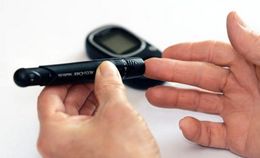Hypothyroidism is the name given to a condition characterized by underfunction of the thyroid, a butterfly-shaped gland located in the front of the neck below the Adam’s apple. Hormones produced by the thyroid affect many important body functions Including lipid metabolism and carbohydrate metabolism, growth, the cardiovascular system and the reproductive system.
Hypothyroidism is one of the most common endocrine or hormone-related disorders. In general, about 6% of women have been diagnosed; it’s not unheard-of for men either, with about 2.5% of guys with the diagnosis as well. And it’s strongly associated with aging, though it can occasionally be seen in teenagers and even infants[i].
The list of hypothyroidism indicators is lengthy and familiar to many, including fatigue, chilliness, constipation, dry skin, thinning hair and unexplained weight gain. It is the combination of these most common symptoms that usually compels a visit to the doctor.
Signs and symptoms that are less obvious include: high cholesterol, puffiness in the face, hoarseness, muscle weakness, muscle achiness or stiffness, stiff or swollen joints, a heavy or irregular menstrual period, depression, impaired memory and nerve entrapment (such as carpal tunnel syndrome).
Hypothyroidism tends to progress with time and age. There may be no symptoms for many years, however, if left untreated there is increasing risk for serious cardiovascular and other consequences.
Medical treatment of hypothyroidism
Once diagnosed, conventional treatment of hypothyroidism usually involves a prescription for a synthetically produced form of one of the major thyroid hormones (T4), available under a few different brands. It is typically recommended that this drug be taken for the rest of your life in order to compensate for the thyroid not producing enough of this hormone.
Other options include prescription-only drugs made from animal sources, which also need to be taken for the duration.
Those with milder or early-stage hypothyroidism can see benefits from a range of over-the-counter supplements, although there is less evidence supporting the effectiveness of some of these products.
Dosing for prescription drugs often needs to be adjusted when first prescribed, and it’s not unusual for adjustments to be required afterwards as well.
Many taking prescription drugs for thyroid underfunction experience few side effects and when appropriately dosed, symptoms can be sufficiently resolved.
However, for some, there may be more frequent need for medication adjustments, as well as unresolved symptoms or new symptoms.
This is when it can be helpful to understand “the bigger picture” of hypothyroidism.
Exploring what’s behind your hypothyroidism
The thyroid gland is part of the larger endocrine system, which includes the hypothalamus and pituitary glands (both found in the brain), constituting what is sometimes called the Hypothalamus-Pituitary-Thyroid (HPT) axis. The thyroid gland itself produces two main hormones, T3 and T4 (which is a precursor to T3). The HPT axis is essentially a highly complex feedback system involving the three endocrine glands and several hormones they release.
There are many factors that can cause thyroid underfunction: genes (one or both parents with hypothyroidism), exposure to radiation (this could be occupational, environmental, or a consequence of past medical treatments), a pituitary tumor, and certain prescription drugs such as lithium, prednisone, opioids and hormonal birth control. For some women, hypothyroidism can be triggered by pregnancy.
A surprising factor largely under our control that can contribute to hypothyroidism is excess use of iodine supplements such as kelp.
Complicating matters even further is that the most common underlying reason for thyroid underfunction is Hashimoto’s thyroiditis, an auto-immune disorder, or a condition involving impaired immune system functioning. What’s significant about this is that the main cause of hypothyroidism is not just about the thyroid, or even just the HPT axis, but is a much broader endocrine imbalance[ii]. (Stay tuned for a future post on Hashimoto’s…)
Next steps: get tested
If you want to get to the bottom of your hypothyroidism, it can be helpful to get a thyroid panel blood test. This is more than the standard TSH (thyroid stimulating hormone) test typically required for regular medical treatment, and involves measuring the full range of thyroid-related hormones and antibodies.
Bear in mind, though, that there can be various ways of interpreting these test results: functional medicine doctors and naturopaths typically employ different ranges of “normal” than conventional doctors.
And it gets even more complicated. While tests for thyroid antibodies are used to help identify the presence of Hashimoto’s (largely seen as the main cause of hypothyroidism), 10-15% of those with this condition do not test positive[iii]. As well, conventional treatment for Hashimoto’s, a wide-ranging endocrine disorder involving the immune system as well as the gastrointestinal system, tends to be indistinct from treatment of hypothyroidism.
An integrative approach to hypothyroidism
Alongside conventional and functional medicine options, homeopathic remedies, which are federally recognized in the US, can be helpful.
We will first have a long conversation that includes a detailed analysis of all your symptoms, as well as a review of any assessments from your doctor or naturopath resulting from blood tests and other diagnostic tests.
Addressing hypothyroidism typically involves a stepwise approach beginning with a single “constitutional” remedy that helps resolve your complete symptom picture. From there, we might add low-potency remedies that target the endocrine system, the immune system and thyroid and liver function specifically.
If Hashimoto’s has been diagnosed or suspected, other steps would be involved, but more on this in a future post…
While improvement can be seen through gradual resolution of the symptoms of hypothyroidism, re-testing for thyroid hormones and antibodies through your functional medicine doctor or naturopath can also confirm progress.
If as a result of hypothyroidism you accumulated weight over a long period that you’re having trouble losing, please call or Email and ask me about metabolic balance®, the personalized nutrition program I am certified to coach that can help you achieve weight loss and long-term weight management by balancing your metabolism using only whole foods.
For more information, visit my profile, follow me, and learn about WellnessCareOnline, which focuses on balancing hormones, metabolism, weight and mood. And call me for a free 15-minute consultation to learn more about how I work with clients.
What have you done that has helped your hypothyroid symptoms?
[i] https://emedicine.medscape.com/article/122393-overview
[ii] https://www.endocrineweb.com/conditions/hypothyroidism/causes-hypothyroidism
[iii] Mincer, D and I Jialal (2019) “Hashimoto’s thyroiditis” https://www.ncbi.nlm.nih.gov/books/NBK459262/




















